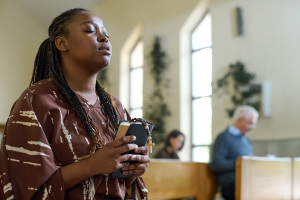Ask Chuck: Guaranteed income programs will create more poverty
Dear Chuck,

We believe in helping the poor, and we actively support numerous organizations along with our church’s benevolence program. Help us know how to educate those who think guaranteed basic income is a compassionate way to help the hurting.
Distressed over Guaranteed Income Programs
Dear Distressed over Guaranteed Income Programs,
You are right in being concerned. Several cities across the United States give low-income families a guaranteed basic income. I wrote about this trend in my book Seven Gray Swans. It is my opinion these efforts will ultimately create more of the problem that they are intended to solve.
Guaranteed income programs
An article at msn.com, “One State’s Considering Giving People $9,000,” reports that Stanford University’s Basic Income Lab counted more than 150 guaranteed income programs in America’s history. Most took place in the past five years.
Pilot programs are funded by the federal government (taxpayers), foundations, and state and local taxpayers. For one to three years, recipients will receive income with no strings attached. This is not a loan or wages for labor. The recipients have zero accountability for the use of funds. It amounts to a charitable gift to private citizens, so it is mislabeled as “income,” which is normally associated with compensation for a job or task.
On April 9th, Business Insider reported several active and proposed plans:
- California: In 2021, a five-year, $35 million project was budgeted for LA, San Francisco, and Sacramento. Thousands have participated.
- Michigan: Flint plans to give new and expecting mothers $1,500 followed by $500 monthly for the baby’s first year of life, funded by the government and grants.
- Massachusetts: Somerville is giving 200 families $750 monthly for housing using ARPA funds. (ARPA is the $1.9 trillion American Rescue Plan Act signed by President Biden in 2021 for pandemic relief.)
- Illinois: Chicago used $31.5 million in ARPA funds for 5,000 residents.
- Texas: Harris County, which includes Houston, budgeted $20.5 million in ARPA funds to be given to low-income households: $500 for 18 months. (Attorney General Ken Paxton sued Harris County to block the program days before payments were to begin.)
Taxes upon taxes
Bill SB3462 would require a guaranteed income of $1,000 to Illinois residents, regardless of immigration status, for those who provide care for a child or other specified dependent, for those who recently gave birth or adopted a child, or for anyone enrolled in an educational or vocational program. Certain eligibility determinants must be met, with implementation after the 2027 calendar year.
Fox2Now reports that opponents fear that “the program could come with unintended consequences, like reducing work productivity or not directly addressing poverty within the state.” Funding will come through taxpayers. I should mention, “Illinois already levies the highest state and local tax rates in the nation, making increasing the state’s tax burden an untenable solution, particularly as hundreds of thousands of residents and major corporations flee the state each year.”
A long list of possible problems
The concept of GBI (Guaranteed Basic Income) has been discussed for decades, but the cost and effectiveness of the programs are questioned. It is assumed that individuals know how to best spend the money: paying rent, buying groceries, or paying off debt. Yet after the pandemic fund fiasco, it does not take a PhD in economics to question that logic.
Are these people not needed in the workforce? Would they rather be paid and make a contribution to society? What funds are being robbed to finance guaranteed income programs? How much will our taxes increase? What are the long-term consequences? Does the government simply print more money or go into debt to be able to afford this program? Will people move to another state just to receive these benefits? Who qualifies, and why do they need a guaranteed income? What if my city already offers programs for needy individuals? Who sets the amount that is distributed, and will it be capped? On and on …
While some cities are providing GBI programs and conducting research funded by government and/or private foundations, others have scrapped them.
The Foundation for Government Accountability, FGA, cites several reasons why guaranteed or universal basic income is “a bad idea”:
- It is expensive.
- Welfare programs have a proven track record of reducing labor force participation.
- Welfare expanded without strings during the pandemic, and many Americans earned enough money to not return to work. The result? A worker crisis from which we have not fully recovered, businesses closing, and rampant inflation.
- Government spending can be devastating to family budgets, increasing the costs of food, housing, and clothing. After this administration increased food stamp benefits, grocery prices rose by at least 15%.
The Bible offers a better way
God made man to work — to be a creative, capable producer who can add value to any enterprise. In exchange for that labor, the needs of the worker will be supplied. This gives meaning to life and deep satisfaction for earned achievement. Encouraging work over welfare will raise incomes, rescue families from dependency, and create less government dependency than we have now.
“Now we command you, brothers, in the name of our Lord Jesus Christ, that you keep away from any brother who is walking in idleness and not in accord with the tradition that you received from us. For you yourselves know how you ought to imitate us, because we were not idle when we were with you, nor did we eat anyone's bread without paying for it, but with toil and labor we worked night and day, that we might not be a burden to any of you. It was not because we do not have that right, but to give you in ourselves an example to imitate. For even when we were with you, we would give you this command: If anyone is not willing to work, let him not eat. For we hear that some among you walk in idleness, not busy at work, but busybodies. Now such persons we command and encourage in the Lord Jesus Christ to do their work quietly and to earn their own living” (2 Thessalonians 3:6–12 ESV).
GBI may lift or temporarily reduce poverty for some individuals. However, giving money with few constraints can result in fraud and fund negative habits, perpetuating the poverty cycle. I view this as a “Robin Hood Plan” to tax the rich and distribute to the poor. We should not forget that Robin Hood is a work of fiction.
For more information, read these articles.
Chuck Bentley is CEO of Crown Financial Ministries, a global Christian ministry, founded by the late Larry Burkett. He is the host of a daily radio broadcast, My MoneyLife, featured on more than 1,000 Christian Music and Talk stations in the U.S., and author of his most recent book, Economic Evidence for God?. Be sure to follow Crown on Facebook.





























